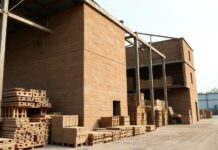Australian engineers have developed a circular economy solution for disposable face masks in a bid to tackle pandemic-generated waste.
A world-first study by RMIT University researchers has shown that using recycled face mask material to make just one kilometre of a two-lane road would use up about three million masks, preventing 93 t of waste from going to landfill.
The mix of shredded single-use face masks and processed building rubble meets civil engineering safety standards for road materials. Analysis shows the face masks help to add stiffness and strength to the final product, which is designed to be used for base layers of roads and pavements.
Dr Mohammad Saberian, a research assistant at RMIT’s School of Engineering, said that multidisciplinary and collaborative approaches are needed to tackle the environmental impact of COVID-19 — particularly the risks associated with the disposal of used personal protective equipment (PPE).
“This initial study looked at the feasibility of recycling single-use face masks into roads, and we were thrilled to find it not only works, but also delivers real engineering benefits,” he said.
“We hope this opens the door for further research, to work through ways of managing health and safety risks at scale and investigate whether other types of PPE would also be suitable for recycling.”
The use of PPE has increased dramatically during the COVID-19 pandemic, with an estimated 6.8 billion disposable face masks being used across the globe each day.
How it works
However, the researchers found that adding shredded face masks to RCA enhances the material while simultaneously addressing environmental challenges on two fronts: PPE disposal and construction waste.
The optimal mixture — 1 per cent shredded face masks to 99 per cent RCA — delivers on strength while maintaining good cohesion between the two materials.
Construction, renovation and demolition account for about half the waste produced annually worldwide, and in Australia, about 3.15 million t of RCA is added to stockpiles each year, rather than being reused.
The mixture performs well when tested for stress, acid and water resistance, as well as strength, deformation and dynamic properties, meeting all the relevant civil engineering specifications.




























